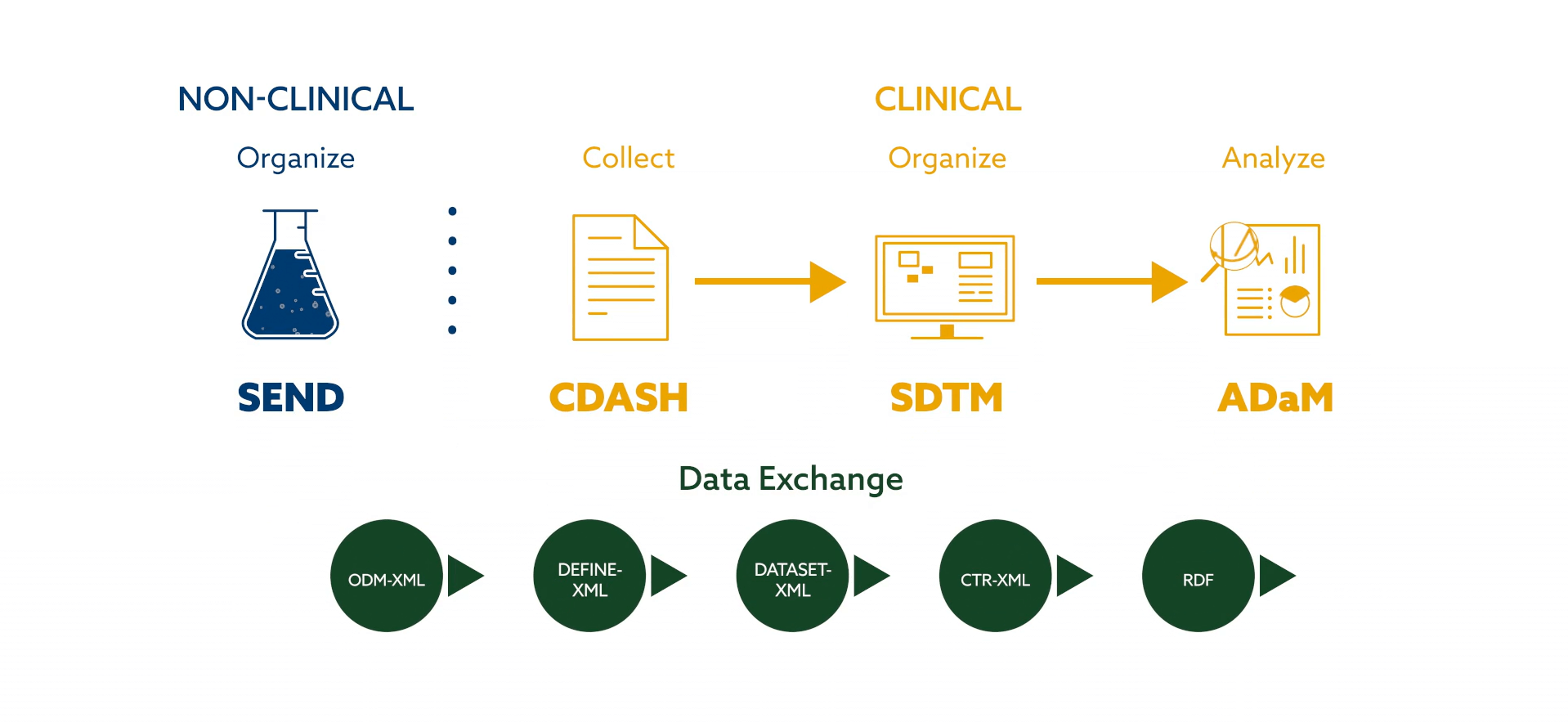Clinical trials are essential to advancing medical science and providing patients with novel treatments. The optimization of clinical trial operations depends critically on effective data management and adherence to CDISC guidelines.
Clinical data management is the systematic gathering, organizing, validation, and analysis of data produced during clinical trials and healthcare research activities. (1) Clinical data management is also the process of collecting, cleaning, and managing subject data in compliance with regulatory standards. The primary objective of the clinical data management process is to provide high-quality data by keeping the number of errors and missing data as low as possible, gathering maximum data for analysis. (2)
Clinical Trial Data Management is a complex task. It starts with the design and development of the study report forms (CRFs), data entry, data cleaning, and database locking process, to data extraction and transmission to statisticians for final analysis (3). This process involves stakeholders; physicians, investigators, epidemiologists, CRA, project managers, and everyone related to the clinical trial operation.
This activity is performed parallel throughout the trial execution. It contains data capture planning, software validation, quality controls, resolving data inconsistencies, and preparing data sets for analysis and reporting. Clinical Data Management includes activities like clinical trial follow-up, query reports, interim analysis, database reviews, query cleaning, and freezing and delivering the database for early decision-making.
One of the primary purposes of managing the Clinical Data is to support the overall trial objective and satisfy the data necessities under one ethical premise, to benefit people. To do this, sponsors must make decisions regarding safety, efficiency, and possible benefits with clean and trustable data through the trial conduction. This is one of the reasons why Data Management is so important.
Another important goal of clinical data management is to produce high-quality, consistent, and trustworthy data that can allow thorough analysis and ease regulatory submissions. That is why it is essential to guarantee the validity and integrity of the clinical research findings by adhering to defined protocols and using strict quality control techniques.
Therefore, biostatisticians must analyze clean, real, accurate, safe, logical, related, and trustworthy data with detailed variables, subjects, interventions, and well-described statistics.
Clinical Trial Data Management Standardization
CDASH and SDTM provide a framework for collecting and standardizing clinical trial data, allowing for quick analysis and evaluation by regulatory agencies.
CDASH was first created by the Clinical Data Interchange Standards Consortium (CDISC) initiative. CDSIC initiated work on CDASH standards in October 2006. It was an interdisciplinary team effort (data managers, statisticians, medical monitors, and programmers). Since then, the standards have been adopted by three International Conference on Harmonization regions – USA, Europe, and Japan. (4). The last CDASH and current version 1.2, was issued on 28 September 2021, and the latest version SDTM v2.0 on 29 November 2021. (5)
CDISC aims to “develop and advance data standards of the highest quality to transform incompatible formats, inconsistent methodologies, and diverse perspectives into a powerful framework for generating clinical research data that is as accessible as possible” (5). Moreover, standardization has led to more secure processes and ensured data integrity during database transfers. Here are the data standards according to CDISC:

Implementing strong data management techniques and adhering to CDASH/SDTM/ADaM criteria provide various advantages throughout the clinical trial. Improve data quality, faster analysis, expedited regulatory submissions, and increased operational efficiency contribute to excellence in clinical trial outcomes.
Organizations may enhance their clinical trial procedures and stay as leaders in medical research and the development of medicines and vaccines by embracing these best practices and employing cutting-edge technologies.
References:
- Krishnankutty B, Bellary S, Kumar NB, Moodahadu LS. Data management in clinical research: An overview. Indian J Pharmacol. 2012 Mar;44(2):168-72. doi: 10.4103/0253-7613.93842. PMID: 22529469; PMCID: PMC3326906. Link: https://www.ncbi.nlm.nih.gov/pmc/articles/PMC3326906/
- Gerritsen MG, Sartorius OE, vd Veen FM, Meester GT. Data management in multi-center clinical trials and the role of a nation-wide computer network. A 5-year evaluation. Proc Annu Symp Comput Appl Med Care. 1993:659–62. Link:
https://www.nia.nih.gov/research/dgcg/nia-glossary-clinical-research-terms - Gaddale JR. Clinical Data Acquisition Standards Harmonization importance and benefits in clinical data management. Perspect Clin Res. 2015 Oct-Dec;6(4):179-83. doi: 10.4103/2229-3485.167101. PMID: 26623387; PMCID: PMC4640009. Link: https://www.ncbi.nlm.nih.gov/pmc/articles/PMC4640009/
https://www.cdisc.org/about











